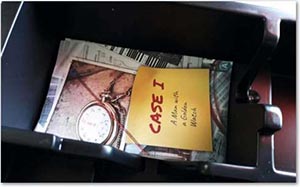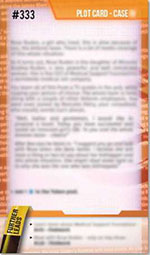
Skill Tokens
At the start of a case, each investigator and consultant adds their Skill tokens to the team's Token pool; some characters have no tokens. Skill tokens do not refresh at the end of the day, so this pool is a supply for the whole team for the entire case. There are four types of skills:

RESEARCH represents the ability to browse through old archives and files , and speak with librarians . It also represents your general knowledge and thoroughness during an investigation.

TECHNOLOGY represents the ability to use modern technology to gather information , including browsing government databases , hacking into private systems , creating complex search algorithms, etc.

QUESTIONING represents the ability to talk with witnesses, interrogate suspects, read body language, ask others for help or favor, etc.

PERCEPTION represents the ability to spot small details at the crime scene , to find and link evidence , and to imagine the crime and process it internally in order to find missing details. It is also useful in lab work, where spotting the smallest details matter.

A WILD SKILL TOKEN can be used as a substitute for any the four types of Skill tokens.
Authority Tokens

Authority tokens represent how well your team is regarded at Antares. Investigators begin each case with a fixed number of Authority tokens in the Token pool (as noted in the introduction). Investigators may spend Authority tokens from the Token pool to activate their abilities.
During the game, investigators may be able to gain more Authority tokens as they proceed in their investigation. Being rewarded with these tokens during the game is a good indication that the investigation is moving in the right direction.
Having Authority tokens also allows investigators to persuade superiors and subordinates to assist them in a variety of ways; some lead cards, for example, ask you to discard Authority tokens from the pool in order to achieve something (e.g., acquire an arrest warrant).
Important:
Investigators may spend one hour each day using the "Write a report" action to add one Authority token to the Token pool.
Sometimes you will need to spend Authority tokens to Follow a particular Lead.
You can't have more tokens in your Token pool than the ones provided in the box. If you are instructed to add more than are available, simply ignore that instruction.
Authority tokens may be crucial in some parts of the case, so watch your supply of tokens carefully!
Matching Evidence
When you encounter a signature, visit ANTARESDATABASE.COM, click the "SIGNATURE" button, then type the 12-character case-sensitive signature into the form. The system will automatically recognize the signature type and add a short description.
You can add your own description as well, such as what the signature is related to (e.g., fingerprints on a knife on card #108). You have access to all signatures entered in the system at any point during the game. Signatures are divided into three categories - Dactyloscopic (SD), DNA (SDNA) and Material (SM) - and they represent examined fingerprints, blood, hair, dirt, and many other types of evidence.
The Antares Database can match evidence with various people of interest and with one another, giving you valuable data or even enabling an arrest.

Example: If you examine the evidence in The Lab or find lab results elsewhere, they will often include Signatures that you have to input to the Antares Database. There you can match them with other collected evidence and learn some new information - for example about the identity of a suspect! If your match is significant for your case, you will earn additional points that will be automatically added to your final scoring.
Important:
Signatures never match all twelve characters.
The character 'x' represents an incomplete signature.
The Antares Database matches signatures to help you find matching entries.
Inputting encountered Signatures into the Antares Database is mandatory!
Saving The Game
When you finish a case, note which cards that you gained during the investigation you can access from both sides, and which you can access only from the front side. Then place all of those cards in the dedicated spot of the insert. You can access these cards in all future cases, but only as notes - they cannot be used for any actions! All other cards from the case are no longer available in the game.
You should also keep all notes you make during the game. Detective is a campaign game, and all the cases are connected, with characters, names, places, clues, and plots part of the big story.

Play Testing Tip
It's good to spend a few minutes at the end of a case to summarize the most important facts, names, and theories that you had during the game. This will be very helpful when you continue the game after a few days - or weeks! After all, approaching the next case with only a vague memory of the previous plot, main characters, and clues is a good way to lose the upcoming case.
Investigators
Detective is for 1 to 5 players, each of whom must choose one investigator that they will play. The main features of a character are their abilities and skills. Skills are simply added to the Token pool at the start of a case.
Abilities let you gain or spend authority tokens and use them to gain new actions not provided by the basic rules. All abilities can be used only once per day! After using an ability, place a  on the character tile as a reminder.
on the character tile as a reminder.
Remove all  from all character tiles when you start a new day.
from all character tiles when you start a new day.
The five investigator characters in the base game are:

Jack Coleman, Former Cop
When investigators take the "Write a report" action , add 2  instead of 1 to the Token pool. Remember that you can Write a report only once per day!
instead of 1 to the Token pool. Remember that you can Write a report only once per day!

Chris Stone, Former Private Eye
Spend 1  from the Token pool and the appropriate Skill token to Dig Deeper on a lead card that has already been resolved and stored on the right side of the game board . Sometimes new facts will make you change your mind about a seemingly dead lead!
from the Token pool and the appropriate Skill token to Dig Deeper on a lead card that has already been resolved and stored on the right side of the game board . Sometimes new facts will make you change your mind about a seemingly dead lead!

Ben Harris, Former FBI Analyst
Spend 2  from the Token pool to add 1
from the Token pool to add 1  token to the Token pool.
token to the Token pool.

Julia Jacobson, Former Investigative Journalist
Spend 1  from the Token pool to change 1 Skill token of any type in the pool into 1
from the Token pool to change 1 Skill token of any type in the pool into 1  token.
token.

Mia Roberts, Former Psychologist
Spend 1  from the Token pool to remove
from the Token pool to remove  token from another investigator.
token from another investigator.
Consultants
Depending on the number of players, you will be assisted by 0-4 consultants. At the beginning of the game, gather all the Skill tokens given to you by consultants and add them to the Token pool.

Plot Cards

Plot cards represent leads that are not related to the particular case you are solving, but to the main plot of the campaign.
When you discover leads related to the main plot, you will be asked to place Plot card number YYY into case number ZZZ. This information may not add much to your present investigation, but in relation to the whole campaign it may make a difference!
When asked to add Plot cards to a future case, take the appropriate Plot card and, without reading it, add it to the zip bag dedicated to the appropriate case. (In the box, you will find zip bags for cases 2-5).
Important:
Don't read a Plot card when you draw it; wait until the beginning of the appropriate case.
Plot cards often indicate that you're going in the wrong direction of your current case. However, they are a good indication that you are closer to digging up the main plot of the campaign.
Continue Reading
